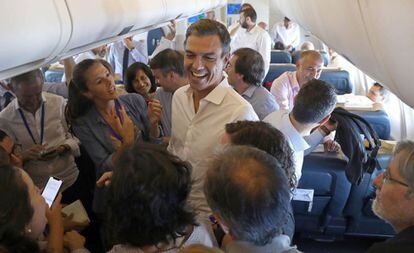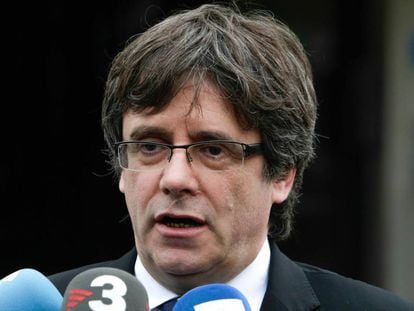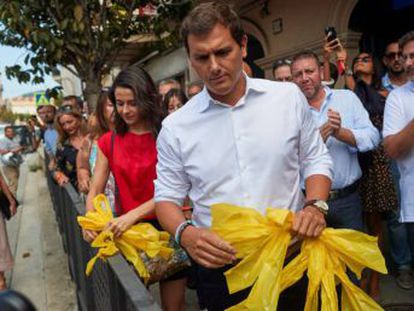Spain’s new PM in favor of a vote in Catalonia – but not on independence
Speaking to the Cadena SER radio network, Pedro Sánchez has ruled out influencing the public prosecutor to drop the rebellion charges against pro-independence politicians


The solution to the problem of the ongoing independence drive in Catalonia lies with a vote. That’s an idea that a significant part of the northeastern Spanish region’s inhabitants have long been calling for, and that the current Socialist Party (PSOE) prime minister, Pedro Sánchez, has now accepted as a possibility – in stark contrast to the hardline position taken by his conservative Popular Party (PP) predecessor, Mariano Rajoy.
But there is an important nuance to Sánchez’s stance: there will not be a vote on self-determination, something that would be impossible according to the Spanish Constitution in its present form. Rather, he would like to see a vote on a new regional statute – the legal framework covering the rights and obligations of the citizens of Catalonia, as well as the region’s financing, political institutions and competences. So he said this morning during an interview with the Spanish radio network Cadena SER.
Since he came to power earlier this year, Sánchez has sought to offer messages of dialogue
Since he came to power earlier this year, after winning a vote of no confidence against Rajoy, Sánchez has sought to offer messages of dialogue to supporters of Catalan independence – the PSOE has formed a minority government, and is dependent on a wide range of parties to get things done in Congress, including Catalan pro-independence groups.
“Catalonia has a statute that it didn’t vote for, and as such there is no political problem,” he said this morning, in reference to the changes made to the text by the Constitutional Court – as a result of an appeal filed by the PP – after it had been voted on by the Catalan people.
But Sánchez also had a warning that Article 155 is there and ready to be used should the Catalan regional government opt to take unilateral action once more. “[Article] 155 is a perfectly legitimate instrument to return Catalonia to the Constitution,” he said. “We are not there right now, but if that happens, the government will take action.”
The PP government of Mariano Rajoy made use of Article 155 last year after the regional government held an illegal referendum on independence on October 1, and then at the end of the month voted a unilateral declaration of independence through the Catalan parliament. Madrid used the article of the Constitution to suspend the region’s autonomous powers, and sack the entire government. After fresh elections were held and a new regional administration formed, led by pro-independence parties, Article 155 was lifted.
Sánchez had a warning that Article 155 is ready to be used should the Catalan regional government opt to take unilateral action
The strategy that Sánchez is using – that of offering dialogue, but at the same time making clear that he will be firm if there are difficult decisions to take – marked the interview this morning. The prime minister is offering dialogue, but will not grant the secessionists what they want when it comes to the very delicate issue of the position of the public prosecutor in the ongoing judicial probe into the actions of the Catalan politicians who are either in pre-trail custody, or – like former premier Carles Puigdemont – fled Spain to avoid arrest.
In an interview with EL PAÍS, Catalan deputy regional premier Pere Aragonés has called on Sánchez to use his influence with the public prosecutor to withdraw the most serious charge against the politicians: that of rebellion, which carries with it a maximum prison sentence of 30 years. A court in Germany has already refused to extradite Puigdemont to Spain to face that charge, on the basis of insufficient evidence.
Speaking to Cadena SER, Sánchez made clear that the public prosecutor is independent and that the central government will respect its autonomy. All eyes in Catalan politics are waiting to see whether there is a shift in this position.
English version by Simon Hunter.












































